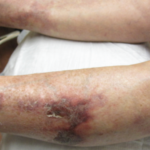I would have no problem injecting the knee with corticosteroids with an INR (international normalization ratio) around 3. I have injected many joints under these circumstances without any complications (just have an experienced hand perform it). Intravenous (IV) steroids can also be used.
I think that steroid use for brief periods is safe (again, from personal experience). How many chronic obstructive pulmonary disease (COPD) patients with exacerbations from pneumonia are given IV steroids without terrible consequences? I feel that steroids are given a bad rap and in short bursts, as used for treating gout—especially with NSAIDs contraindicated—they are a viable option.
With creatinines of 1.5 to 1.8 in a similar setting, IV colchicine can be tried at 1 mg and possibly repeated in 24 hours. I have used this administrative route many times in the past with good results. The referring attending is always reluctant to use it as well and, unfortunately, formularies are following suit.
Steve Fink, DO, Chief of Rheumatology
VA Medical Center, Seminole, Fla.
The patient most likely has gout, but he could have a septic knee. I feel you have no choice but to aspirate his knee. I have aspirated and injected hundreds of joints in patients on coumadin. To my knowledge, none has developed a hemarthrosis. Given your patient’s circumstances I would have no problem aspirating his knee. If crystals were seen and the gram stain is negative, I would then treat with intra-articular steroids.
IV colchicines are not on formulary in many hospitals and a bad idea with elevated creatinine. ACTH is not much different than exogenous steroids, but would be my second option.
James S. Cohen, MD, Rheumatologist
Arthritis Care Center, Indianapolis, Ind.
I think I’d vote for an intra-articular injection of steroids as long as some antibiotics were already on board, and I’d strongly consider colchicine 0.6 QOD or Q3D to prevent future flares, as the likely trigger of lasix with congestive heart failure is going to continue. Perhaps the risk of an intra-articular bleed with an INR of 3 is less than the likely morbidity of ensuing inflammation in that knee.
Jonathan Samuels, MD, Director, Clinical Immunology Laboratory
NYU Hospital for Joint Diseases, New York City
I would have given IV colchicine, 1 mg x1, to your elderly man with gout on top of multisystem failure.
Ronenn Roubenoff, MD, MHS
Senior Director, Immunology Medical Research
Biogen Idec, Inc., Cambridge, Mass.

